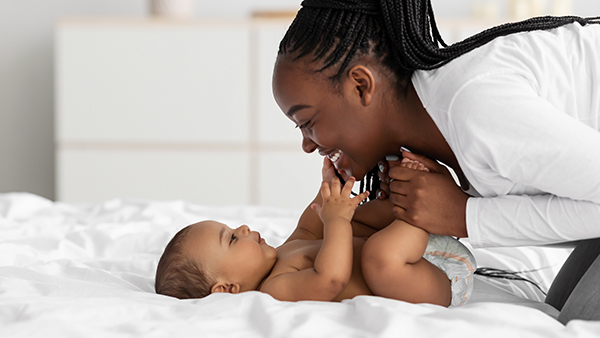

Expert health content provided
by Harvard Health Publishing.
Six frequently asked questions about newborns
Many moms have questions when it comes to their newborn babies.
Many new moms think they'll know exactly what to do when they have a baby. But once you're holding your little one in your arms, you might have questions. These frequently asked questions from other new moms can help you keep your baby safe and comfortable during their first few weeks of life.
![]()
As a general rule, dress your baby in one more layer of clothing than you are wearing. On very hot days, a diaper and a cotton undershirt is fine. . On cooler days, dress your baby in layers so you can take off a layer when it gets warmer. Hats protect your baby against the hot sun and also help maintain body heat in cool weather.
Babies lose body heat easier than adults, but they can still get overheated if wearing too many clothes. Check your baby's skin temperature by feeling the back of his neck or his arms or chest — not his hands or feet. If your baby is too warm, his skin feels hot all over. He may look flushed, feel sweaty, or develop a bumpy heat rash. If your baby is too cold, his skin feels cold, and he may be fussy or curled up tightly to keep warm.
You can start taking your baby outside the day you're discharged from the hospital. If dressed appropriately, most full-term newborns are fine with average summer and winter temperatures. If the weather is extremely cold or hot, don't stay out too long.
Newborns are more likely to catch germs and illnesses because their immune systems are not fully developed. Avoid crowds, especially indoor crowds, until your baby is at least 2 months old. Don’t let anyone hold your baby if they are sick or have been exposed to anyone who is sick. People should wash their hands before holding your baby. It’s a good idea to limit the number of people who hold a newborn.
If you are considering travel with a newborn, talk to your doctor.
Many newborns have dry, peeling skin because they are no longer surrounded by water, as they were in the uterus. But in most cases, you don't need special lotions or creams to treat this type of dry skin. After a few sponge baths, your baby's skin likely becomes smooth and the dryness disappears.
Babies don’t need lotions, but if you choose to use one on your baby, use one without any perfumes or dyes. If you have any questions, check with your doctor.
The best way to take a baby's temperature is with a rectal thermometer. Other methods are not always accurate. Here's how to do it:
- Use a digital thermometer, not a glass thermometer which may contain mercury.
- Wash the thermometer in warm, soapy water or rubbing alcohol.
- Put a small amount of lubricant such as petroleum jelly on the end of the thermometer and on your child's bottom.
- Hold the child bottom-up on your lap with the legs hanging down. Or put the child down on their back on a bed with their legs pulled up to their chest.
- Gently insert the lubricated thermometer no more than one-half inch into the child's rectum.
- Hold your baby gently in place until the thermometer beeps.
Once you have used a thermometer this way, do not use it later to take oral temperatures of an older child.
Hiccups are common in babies, especially in those who hiccupped before they were born. You might notice your baby often gets hiccups after meals. This is because babies tend to swallow air when they're eating. These hiccups usually go away within a few minutes. They won't hurt your baby.
Sneezing is a normal reflex that helps remove mucus from the nose and lungs. It's common during the first few days after birth, when newborns still have some amniotic fluid in their lungs. Your baby might also sneeze after eating.
If your baby is sneezing and also has a runny nose, give your doctor a call. It might have a different cause.
